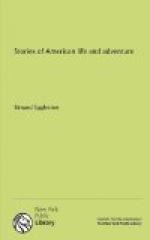All the paths were buried under the deep snow. The young man had no compass. The sun was not shining. How could he tell one direction from another, or find his way to the Indian camp? The tall, straight trees, especially those that stand alone, have moss on the north or northwest side. By looking closely at these trees, he found out which way to go. It was about noon when he got to the camp. The Indians had made themselves snowshoes to go in search of him.
They all gathered about him, glad to see him. But Indians do not ask questions at such a time. They led the young man to a tent. There they gave him plenty of fat beaver meat to eat. Then they asked him to smoke. While he was resting here, they were building up a large fire in the open air. Scouwa’s Indian brother asked him to come out to the fire. Then all the Indians young and old, gathered about him.
His Indian brother now asked him to tell what had happened to him. Scouwa began at the beginning, and told all that had occurred. The Indians listened with much eagerness.
Then the Indian brother made him a speech. He told the young man that they were glad to see him alive. He told him he had behaved like a man. He said, “You will one day be a great man, and do some great things.”
Soon after this, the Indians bought him a gun, paying for it with skins, and he became a hunter.
HUNGRY TIMES IN THE WOODS.
When James Smith, or Scouwa, had been some years among the Indians, he was in a winter camp with two of his adopted brothers. The younger of these, with his family, went away to another place. Scouwa was left with the older brother and his little son.
The older brother was a very wise Indian. He had thought much about many things. He talked to his young white brother on many subjects, and James always remembered him as a great man.
The wise Indian was now suffering from rheumatism. He could hardly move out of his winter hut at all. But he bore it all with gentle patience. Scouwa had to do all the hunting for himself, the old man, and the boy.
Almost the only food to be had was deer meat. From time to time Scouwa succeeded in killing a deer. But at last there came a crust of snow. Whenever the hunter tried to creep up to a deer, the crust would break under his feet with a little crash, and the noise would frighten the deer away. After a while there was no food in the cabin.
Once Scouwa hunted two days without coming back to the cabin, and with nothing to eat. He came back at last empty-handed.
The wise Indian asked him, “What luck did you have, brother?”
“None at all,” said Scouwa.
“Are you not very hungry?” asked the Indian.
“I do not feel so hungry now as I did,” said the young man, “but I am very faint and weary.”
Then the lame Indian told the little boy to bring something to eat. The boy had made a broth out of the dry old bones of foxes and wild-cats that lay about the camp. Scouwa ate this broth eagerly, and liked it.




